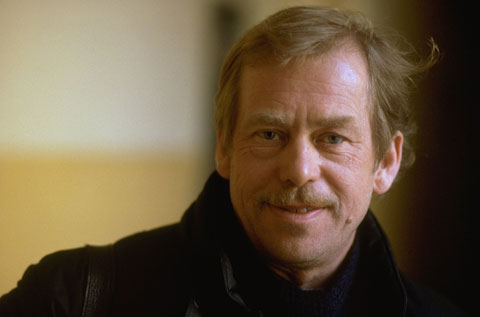Commemorative event in honor of a true friend of Belarusians (+photos)
On
14 January in Minsk the democratic society of Minsk marked the day of
memory of a well-known Czech dissident, the symbol of the "velvet
revolution", first president of the Czech Republic Vaclav Gavel,
who had passed away on 18 December 2011.
The event was
organized by joint efforts of such NGOs as the "For Freedom"
movement, the Committee to Protect the Repressed "Solidarity",
the Human Rights Center "Viasna", the Belarusian Helsinki
Committee and the Belarusian Association of Journalists.
Speeches
about Mr. Gavel, a true friend of the Belarusian people, were
delivered by the representative of the HRC "Viasna"
Valiantsin Stefanovich, the writer Uladzimir Arlou, the director of
the Belarusian office of Radio "Liberty" Aliaksandr
Lukashuk and the guests – the acting Ambassador of the Czech
Republic in Belarus Dagmar
Didenko-Novohradska
and the Ambassador of Slovakia Marian Servatka.
The
stories told by the speakers again proved that Mr. Gavel took all
possible efforts to support civil society activists, politicians and
artists of Belarus, struggling for the right of Belarusians to live
in a free and democratic country which would be a part of the united
Europe.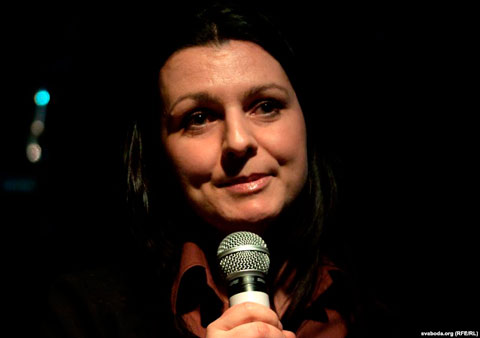
As stated by Dagmar
Didenko-Novohradska,
the Czech people is proud of the fact that its first president acted
for the benefit of Belarus. "I want to say that Vaclav Gavel has
never refused to meet with the Belarusian oppositionists. He is one
of the founders of the "Civil Belarus" and his membership
in this NGOs favored to the recognition of the Belarusian problems
not only in Czech, but also in other countries of the world,"
pointed the Czech diplomat. "We should also remind that Vaclav
Gavel personally wrote a letter to ensure the opportunity for the
well-known Belarusian writer Vasil Bykau (who had received a
residence permit) to live in Czech, which he did almost till the end
of his life. All of us are very proud of it." She also reminded
that the last letter of Vaclav Gavel was addressed to Belarusian
political prisoners. "I would like to express the hope that
there will be no need in such letters in the future. Thank you for
the fact tat Vaclav Gavel keeps living in your hearts as it does in
the hearts of Czechs."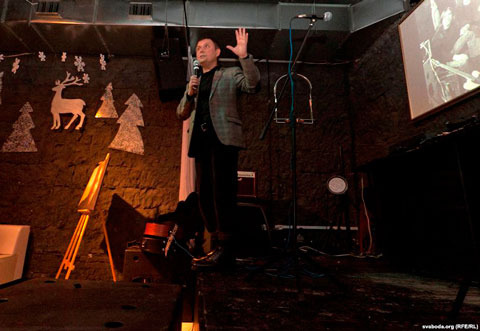
Gavel's attitude to Belarusians
was also described by the head of the Belarusian office of Radio
"Liberty" Aliaksandr Lukashuk who came to the event from
Prague. "If
we look at the photos in this hall, we an see that Aliaksandr
Milinkevich, Andrei Dynko, Ales Bialiatski – many people met with
him, he loved, valued and respected many people. But I want to tell
about one meeting. In 2001, during the terrorist attack on New-York,
Vaclav Gavel had a meeting with Vasil Bykau in his schedule. I think
that probably all European presidents but one would have canceled the
meeting that day. Gavel
did not cancel it. When these two towers collapsed, when the world
did not know what would happen next, whether there would be any
nuclear blasts, when the plane of the US President remained in the
air without landing, Gavel received Bykau. That's how important this
meeting was for him and how well he understood what is Belarus. A
year after Bykau's death we, Belarusians of Prague, met in a cafe in
order to mark his birthday. In this very cafe there was a sitting, at
which Gave was present. We passed him our invitations. He left his
sittings, joined us and marked Bykau's birthday together with
us..."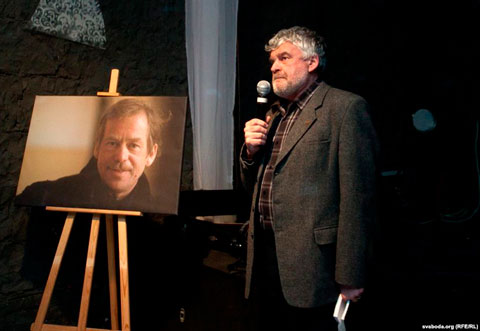
"He became a hero of the Belarusian
literature long ago", said the writer Uladzimir Arlou talking
about his personal meetings with Vaclav Gavel. "I was lucky
enough to be a delegate of the Congress of the international PEN-club
in Prague in 1994. At that time I had several episodic meetings with
Gavel, which I have remembered since then." After this congress
Mr. Arlou wrote an essay "A room with a look on Hradčany",
some excerpts from which, dedicated to the meetings with Gavel, were
read by the author during the event. "For me the congress
started when somebody's iron hands put me up and set me half a meter
aside as a chessman. Vaclav Gavel ran onto the stage through the pass
which was created with such means and made a greeting speech. Among
other things, the delegates are proposed a story about the
president's friend who refused to take a high state position
referring to his wish to secure the creative freedom. "Who will
guarantee this freedom if all of us follow his example?" asks
the president and looks at the audience, where his appeal does not
cause visible enthusiasm." After reading another fragment
Uladzimir Arlou stated: "I dream about the time when we'll have
a president like Vaclav Gavel". The writer said that their
fourth meeting had taken place in March 2012, when he came to Gavel's
grave, located opposite the office of the office of Radio "Liberty".
"Standing there, near his grave, I remembered the words he said
at a conference in Prague several years before his death. He said
that he was deeply convinced that the configuration of the democratic
Europe will become complete only when Belarus becomes a part of it. I
believe that it will surely happen."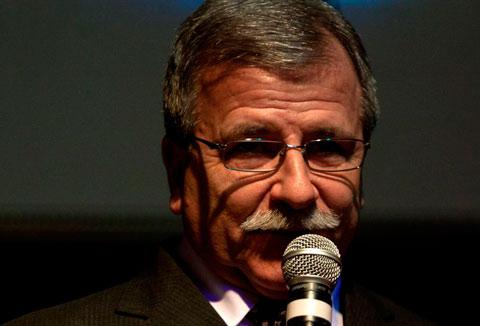
The Ambassador of
Slovakia Marian Servatka,
philologist by education, shared his impressions of Gavel as a
talented publicist and playwright, advising all to read his essays,
and reminded the audience that representatives of Slovakian
intellectual circles were among signers of Charter'77. "I would
like to tell about the phenomenon of Charter. Do you remember 1968,
the Prague spring started in Bratislava, then – the Soviet
intervention, and what came next was terrible. Then there arises
Charter. And that's where anti-Communists and high-rank communists
from Czech met. There weren't many Slovaks in the Charter: the
history knows only 38 surnames. Historians say that Bratislava was
quite far from Prague at that time. This was said by Gavel, who came
to Bratislava on purpose, in order to invite Slovakian intellectuals
to the Charter. Dominik Tatarka, a very famous Slovak writer, was the
first to sign the Charter, after which other Slovaks started joining
him. Vaclav Gavel wrote about it in his memoirs..."
Later
Vaclav Gavel often stressed: "In the conditions of a
totalitarian, half-totalitarian, post-totalitarian, authoritarian or
half-authoritarian regime all those who want changes for the better
must freely unite. If there is a good will and the personal ambitions
are tamed, many people can unite, even if they think differently, to
come to a minimal agreement." Gavel, one of the founders of
"Charter'77" considered it as a successful "model of
resistance to the totalitarian regime which had all military
powers".
The manifest of the Czechoslovak dissidents
which criticized the government for the failure to implement human
rights, was published in the Western press on 6 January 1977. 242
signatures stood under it, and many of the signers suffered
repressions for their deed.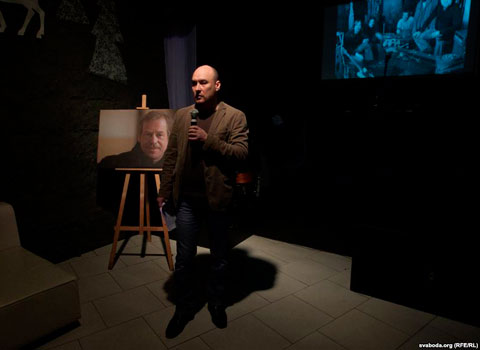
As reminded by the representative
of the Human Rights Center "Viasna" Valiantsin Stefanovich,
the reason for the establishment of the Charter was the arrest of
participants of the Czechoslovak underground band "The Plastic
People of the Universe". "These musicians were charged with
organizing social unrest. The court proceedings were opened and
Vaclav Gavel personally attended all hearings. He said that it didn't
matter what for the people were imprisoned – for their political
views or for wearing long hair and playing the music they wanted to
play. That's what the action of solidarity with the "Plastics"
started and how "Charter'77" came to existence.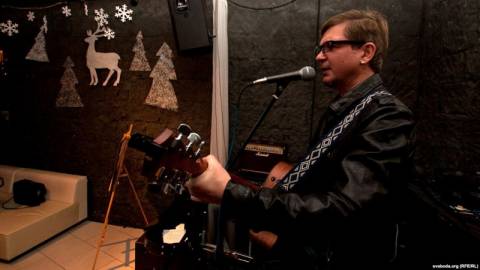
A
well-known Belarusin musician, Liavon Volski, put on a "black
list" by the authorities, played at the event.



